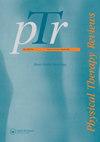Culturally responsive women’s and men’s health physiotherapy for Indigenous people living in regional, rural, and remote Australia
IF 0.8
Q4 REHABILITATION
引用次数: 0
Abstract
Abstract Introduction: Women’s and men’s health physiotherapy involve the assessment and management of pelvic floor dysfunction, incontinence, sexual dysfunction, pelvic pain, and specific areas related to each gender. Dysfunction with these areas has a large impact upon individuals and communities due to the cost of managing the conditions and their symptoms. Indigenous people have poorer health outcomes in Australia due to a lack of access to culturally responsive health care. The aim of this study was to explore if physiotherapists perceived that they could provide culturally responsive women’s and men’s health physiotherapy services to Indigenous people living in regional, rural, and remote Australia. Method: An online survey was distributed through social media Facebook sites to physiotherapists who provide women’s and men’s health physiotherapy services to people living in regional, rural, and remote Australia, from August to November 2020. An inductive approach to analysis was used, linking data to themes. Results: There were 33/54 responses to the question on culturally responsive care, with 29/54 respondents stating that they perceived that they provide culturally responsive women’s and men’s’ physiotherapy services. Examples of services included a weekly clinic with a local Aboriginal medical service, working with aboriginal liaison officers, participating in cultural training and developing culturally sensitive handouts and presentations. A lack of inclusion of culturally responsive practice in postgraduate education was stated as a barrier to gaining knowledge of how to provide services. Low referrals and a low up take of women’s and men’s’ physiotherapy services, lack of funding as well as a lack of culturally appropriate locations to provide services were described as limitations to providing women’s and men’s health physiotherapy services. Conclusion: Physiotherapists may provide culturally responsive, but they feel their knowledge of how to provide culturally responsive services is limited. A lack of referrals and funding also appears to limit their ability to provide women’s and men’s health physiotherapy to all people in regional, rural, and remote Australia.为生活在澳大利亚地区、农村和偏远地区的土著人提供具有文化敏感性的男女健康理疗
摘要导言:女性和男性的健康理疗涉及盆底功能障碍、尿失禁、性功能障碍、盆腔疼痛以及与性别相关的特定区域的评估和管理。由于管理这些疾病及其症状的成本,这些区域的功能障碍对个人和社区产生了很大的影响。由于无法获得符合文化要求的保健服务,澳大利亚土著人民的健康状况较差。本研究的目的是探讨物理治疗师是否认为他们可以为生活在澳大利亚地区、农村和偏远地区的土著居民提供文化反应性的女性和男性健康物理治疗服务。方法:2020年8月至11月,通过社交媒体Facebook网站向居住在澳大利亚地区、农村和偏远地区的人们提供女性和男性健康物理治疗服务的物理治疗师进行在线调查。采用了归纳分析方法,将数据与主题联系起来。结果:有33/54的受访者回答了文化响应性护理的问题,29/54的受访者表示他们认为他们提供文化响应性的女性和男性物理治疗服务。服务的例子包括与当地土著医疗服务机构每周进行一次门诊、与土著联络官合作、参加文化培训和编制对文化敏感的讲义和简报。有人指出,在研究生教育中缺乏对文化有反应的做法是获得如何提供服务的知识的障碍。妇女和男子的物理治疗服务转诊率低、接受率低、缺乏资金以及缺乏文化上适当的地点提供服务被认为是提供妇女和男子健康物理治疗服务的限制。结论:物理治疗师可以提供文化响应性服务,但他们觉得自己对如何提供文化响应性服务的了解有限。缺乏转诊和资金似乎也限制了他们向澳大利亚地区、农村和偏远地区的所有人提供妇女和男子健康物理治疗的能力。
本文章由计算机程序翻译,如有差异,请以英文原文为准。
求助全文
约1分钟内获得全文
求助全文
来源期刊

Physical Therapy Reviews
REHABILITATION-
CiteScore
1.30
自引率
0.00%
发文量
26
期刊介绍:
Physical Therapy Reviews is an international journal which aims to publish contemporary reviews, discussion papers and editorials within physical therapy, and in those basic and clinical sciences which are the basis of physical therapy. The journal is aimed at all those involved in research, teaching and practice within the area of physical therapy. Reviews (both descriptive and systematic) are invited in the following areas, which reflect the breadth and diversity of practice within physical therapy: •neurological rehabilitation •movement and exercise •orthopaedics and rheumatology •manual therapy and massage •sports medicine •measurement •chest physiotherapy •electrotherapeutics •obstetrics and gynaecology •complementary therapies •professional issues •musculoskeletal rehabilitation
 求助内容:
求助内容: 应助结果提醒方式:
应助结果提醒方式:


